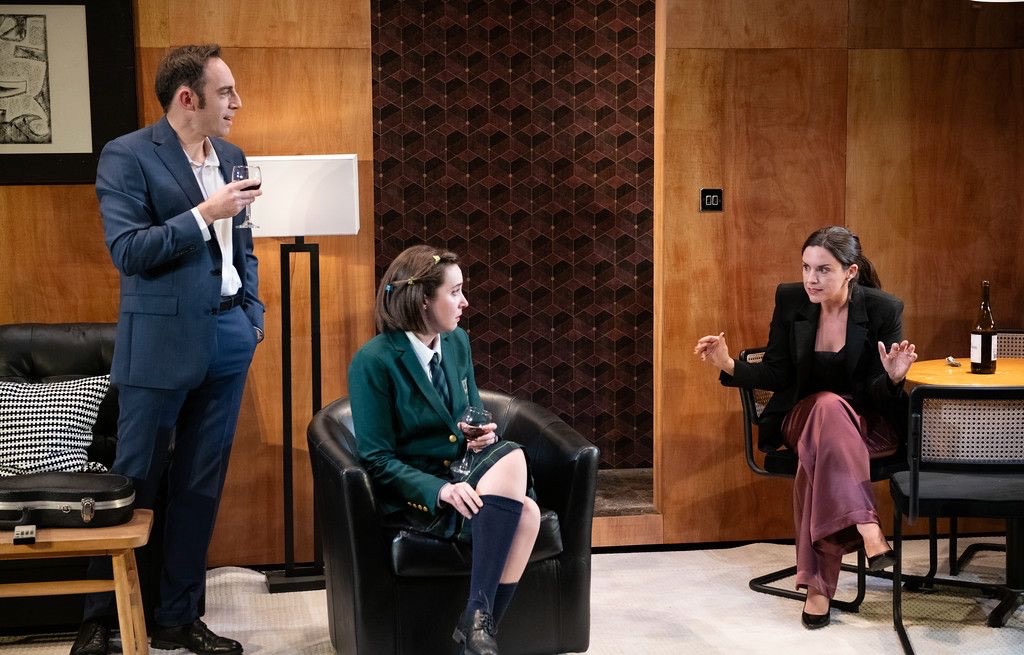Love, Love, Love
At Studio Theatre now.

According to Studio Theatre, Mike Bartlett, the author of Love, Love, Love tells a story that begins in London, 1967. The sixties and all they were, are in full swing, which includes the Beatles and lots of fun. It is the story of Ken and Sandra, two carefree spirits, in a world that belongs to the young. The play then follows them over time for the next forty-four years.
Bartlett, who was born in the 80’s in London, says his thoughts on writing the play were; “My generation would go back home from their tiny flats to visit their parents, who were living in huge houses with big empty rooms and lots of money. And it occurred to me that so many aspects of the culture in Britain preferred that particular generation over young people now -- and because there are more of them and more of them vote, it’s going further and further that way. And then, the other side, which I think is equally important to the play, are the criticisms of the older generation towards my generation: If you care so much, why aren’t you more politically active? Why don’t you do what we did? Why don’t you fight for these rights? Why don’t you protest and vote, and get involved and change things? And they’ve got a point. Are we the generation that moans, but does nothing? Those two opposing views made me think that it’s a great subject to explore through a family over time.”

Unfortunately I have trouble seeing some of what got him to write the play, actually in the play. I am a baby boomer, and the person I took to the play with me is Generation X (or maybe more accurately an xennial), neither of us could really relate to the play. We both thought Sandra was totally annoying throughout the first act, which was basically her giving a monologue, and she was really no more relatable in the next two acts. The only character in the first act who we felt any sympathy for, was Henry, Ken’s brother. The guy Sandra had no trouble hurting. He was the one who brought her home as his date, before she dumped him for his brother, right in front of him. The second act has Ken and Sandra as an annoying middle-class couple, and parents, screaming at each other and in turn screwing up their children, and their marriage. The final act has them as well-off divorced, retirees. They seem totally unconcerned with how screwed up their adult kids are. Their daughter Rose, now 37, accuses them of it being their fault she is what she considers, a loser. One can easily get the idea it is their antics, which had her trying to commit suicide at the age of sixteen, that did screw her up. Their son Jamie, is also a mess, and one is not sure exactly how screwed up he is, and is it drugs, or something else.
Now I guess if you want to believe the acting was good, it is because they wanted you to think they were generally self-centered annoying people, who cared for no one but themselves, screwed around on each other, and caused their daughter to try to commit suicide. Again, I thought there was too much yelling, which was not really needed for the story, to judge the acting. One standout was Madeline Seidman as Rose, especially in the third act.
Now to be fair, others have reviewed this play differently. One such review appeared in the New York Times when it was performed in 2016.
Love, Love, Love is directed by the very talented David Muse. The cast includes Max Gordon Moore as Ken; Liza J. Bennett as Sandra; Max Jackson as the son, Jamie; and Hunter Hoffman as the brother, Henry. The talented creative team includes: Alexander Woodward, Set Designer; Montana Levi Blanco, Costume Designer; Cha See, Lighting Design; and Matthew M. Nielson, Sound Design.
Studio Theatre recommends the appropriate audience age is 13+ as there is strong language and adult themes. The play is in three acts of forty, forty, and thirty minutes, with two fifteen-minute intermissions. Love, Love, Love will be at Studio until February 18th and tickets can be ordered online.





